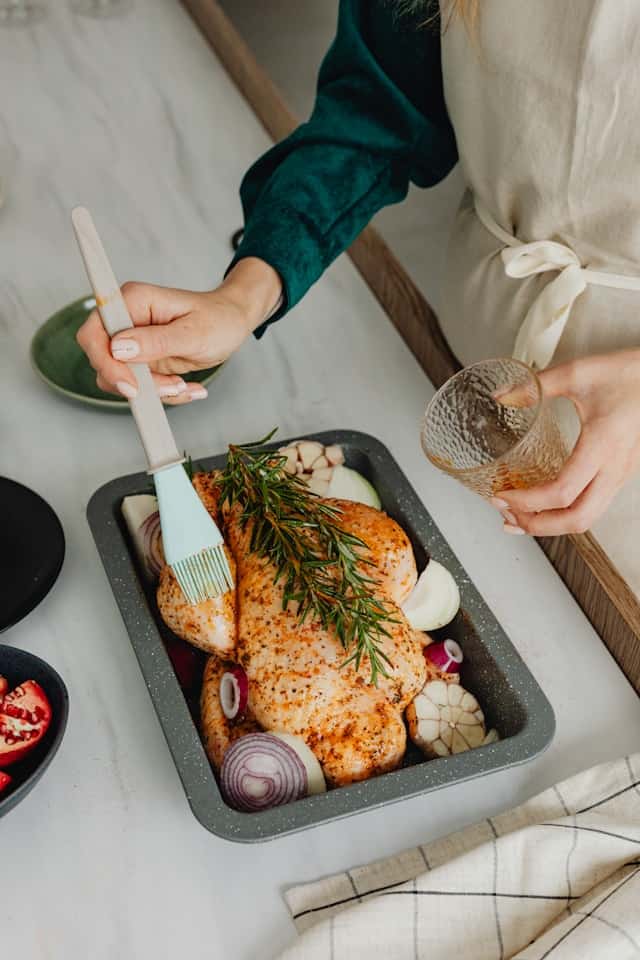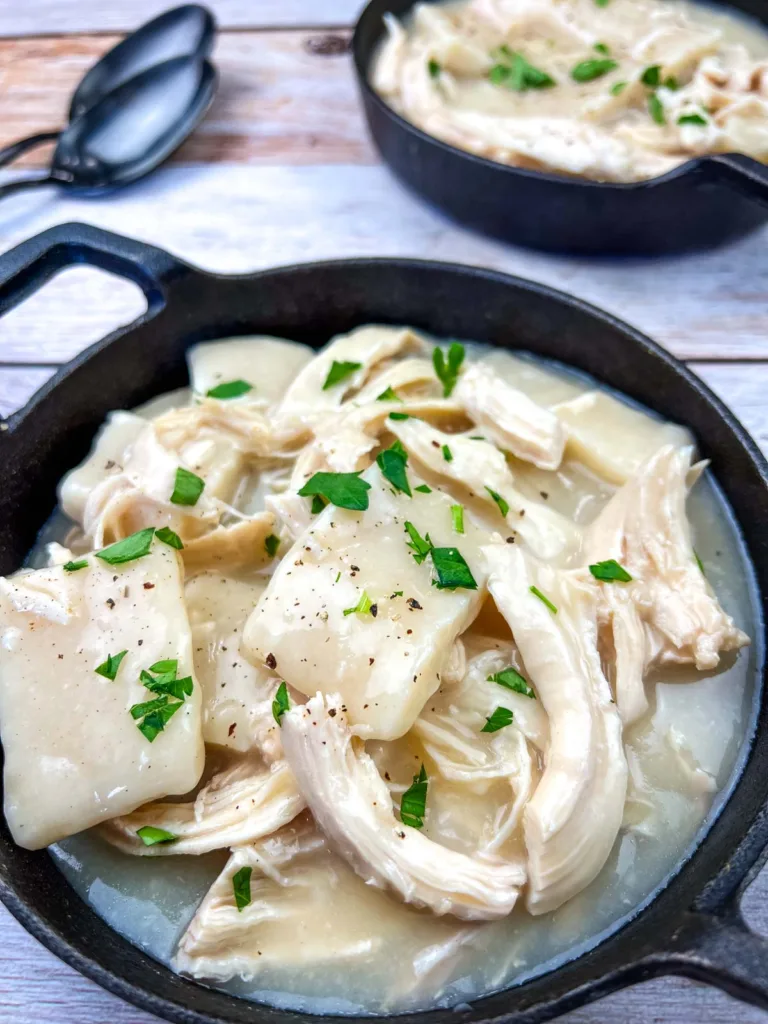If you’re looking to add some flavor to your turkey, marinating is a great way to do it. Marinating turkey can help to tenderize the meat and infuse it with delicious flavors. But how long can you marinate a turkey before it becomes unsafe to eat?
The answer to this question depends on a few factors, including the recipe you’re using and the size of your turkey. According to The Cooking Facts, turkey can be marinated for a minimum of 30 minutes up to 48 hours. However, it’s important to follow the marinating time instructed in the recipe to ensure the best flavor and texture. Over-marinating can also result in the turkey becoming tough and stringy.
If you’re planning to marinate your turkey, it’s important to keep it refrigerated during the marinating process. According to Butterball, you should use a sealable container or large plastic bag to position the turkey in a single layer, and turn to coat all sides. Use ¼ to ½ cup of marinade for every 1 to 2 pounds of meat and marinate meat for 2 to 8 hours. The longer you marinate the stronger the flavor. Discard any leftover marinade that has touched raw meat.

Marinating Basics
Marinating is a great way to add flavor and moisture to your turkey. Before you start marinating your turkey, there are a few things to keep in mind.
Ideal Marinating Time for Turkey
The ideal marinating time for a turkey is at least 12 hours, but it’s even better if you can marinate it for 24 hours. This allows the marinade to really infuse the meat, resulting in a more flavorful and tender turkey. However, it is important to follow the marinating time instructed in the recipe to ensure the best flavor and texture. Over-marinating can also result in the turkey becoming tough and stringy.
Factors Affecting Marination Time
The size of the turkey and the type of marinade used can also influence the marinating time. For a small to medium-sized turkey, such as a 12 to 16-pound bird, marinating it for at least 12 to 24 hours is ideal.
If you are using a highly acidic marinade, such as one that contains vinegar or citrus juice, you should marinate the turkey for a shorter amount of time, such as 2 to 4 hours. This is because the acid can break down the proteins in the meat and make it tough.
When marinating a turkey, it is important to use a non-reactive container, such as a plastic or glass container, to avoid any unwanted flavors from leaching into the meat. Additionally, make sure to always marinate your turkey in the refrigerator, not on the counter, to prevent the growth of harmful bacteria.

Marination Techniques
Marinating a turkey is a great way to add flavor and moisture to your bird. There are several techniques you can use to marinate your turkey, including wet brining, dry brining, and injection marinating. Each technique has its own advantages and disadvantages, so it’s important to choose the one that’s right for you.
Wet Brining
Wet brining involves soaking the turkey in a saltwater solution for a period of time. This technique is great for adding moisture to the bird, as well as infusing it with flavor. To wet brine a turkey, you’ll need to mix together a solution of water, salt, and other seasonings, such as herbs and spices. You can also add sugar, honey, or other sweeteners to balance out the saltiness.
Once you’ve mixed your brine solution, place the turkey in a large container and pour the brine over it. Make sure the turkey is fully submerged in the brine, then cover the container and refrigerate it for the recommended time. The amount of time you’ll need to brine your turkey will depend on its size, but generally, you’ll need to brine it for at least 12 hours, and up to 24 hours.
Dry Brining
Dry brining, also known as dry rubbing, involves rubbing the turkey with a mixture of salt and other seasonings. This technique is great for adding flavor to the bird, as well as helping to crisp up the skin. To dry brine a turkey, you’ll need to mix together a dry rub of salt, herbs, spices, and other seasonings.
Once you’ve mixed your dry rub, pat the turkey dry with paper towels, then rub the dry rub all over the bird, making sure to get it into all the nooks and crannies. Place the turkey in a large container, cover it, and refrigerate it for the recommended time. The amount of time you’ll need to dry brine your turkey will depend on its size, but generally, you’ll need to dry brine it for at least 12 hours, and up to 24 hours.
Injection Marinating
Injection marinating involves injecting a marinade directly into the meat of the turkey. This technique is great for adding flavor to the bird, as well as helping to keep it moist. To injection marinate a turkey, you’ll need to prepare a marinade of your choice, then use a meat injector to inject the marinade into the meat of the turkey.
Make sure to inject the marinade evenly throughout the bird, and be careful not to over-inject, as this can cause the turkey to become mushy. Once you’ve injected the marinade, cover the turkey and refrigerate it for the recommended time. The amount of time you’ll need to marinate your turkey will depend on the size of the bird and the type of marinade you’re using.

Food Safety Considerations
When marinating a turkey, it is important to consider food safety to avoid any risk of foodborne illness. Here are some tips to ensure that your turkey stays safe during the marination process.
Refrigeration During Marination
Always marinate your turkey in the refrigerator, not at room temperature. Leaving the turkey out at room temperature can allow bacteria to grow, which can cause food poisoning. Make sure the turkey is completely covered with the marinade and place it in a leak-proof container or plastic bag. This will prevent the marinade from leaking and contaminating other foods in the refrigerator.
It is recommended to marinate a turkey for no longer than 24 hours. If you marinate the turkey for too long, the acid in the marinade can break down the protein in the turkey, making it mushy and unappetizing. If you have leftover marinade, do not reuse it for basting or as a sauce, as it may contain harmful bacteria from the raw turkey.
Avoiding Cross-Contamination
To avoid cross-contamination, make sure to wash your hands, utensils, and work surfaces thoroughly before and after handling the turkey. Use separate cutting boards and utensils for raw and cooked foods. Do not place cooked food on a plate that previously held raw meat, poultry, or seafood.
When removing the turkey from the marinade, use clean tongs or a clean fork to avoid contaminating the turkey with bacteria from your hands or utensils. Discard any leftover marinade that has come into contact with raw turkey, as it may contain harmful bacteria.

Final Preparations
After marinating your turkey for the recommended amount of time, there are a few final steps you need to take before cooking it.
Post-Marination Steps
First, remove the turkey from the marinade and pat it dry with paper towels. This will help the skin crisp up during cooking. Discard the marinade, as it has come into contact with raw meat and could be unsafe to consume.
Next, allow the turkey to come to room temperature for about an hour before cooking. This will help ensure that the bird cooks evenly.
Cooking After Marination
When it comes to cooking your turkey after marinating, there are a few things to keep in mind. If you plan on roasting your turkey, preheat your oven to the recommended temperature before placing the bird in the oven.
Additionally, keep in mind that marinating your turkey may affect the cooking time. The added moisture from the marinade may cause the turkey to cook faster than usual, so it’s important to monitor the internal temperature of the bird regularly to avoid overcooking.
In summary, to prepare your turkey for cooking after marinating, remove it from the marinade, pat it dry, and allow it to come to room temperature. When cooking, monitor the internal temperature regularly and adjust cooking time as needed.


